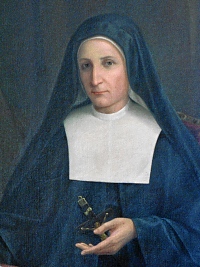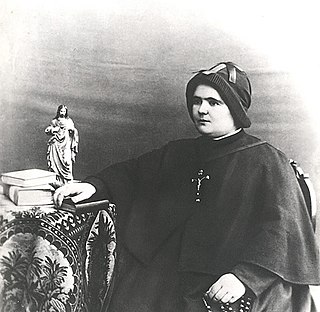
Marianne Cope, OSF, was a German-born American religious sister who was a member of the Sisters of St. Francis of Syracuse, New York, and founding leader of its St. Joseph's Hospital in the city, among the first of 50 general hospitals in the country. Known also for her charitable works, in 1883 she relocated with six other sisters to Hawaiʻi to care for persons suffering leprosy on the island of Molokaʻi and aid in developing the medical infrastructure in Hawaiʻi. Despite direct contact with the patients over many years, Cope did not contract the disease.

Pauline of the Agonizing Heart of Jesus, C.I.I.C., was a Catholic immigrant from Austria-Hungary to Brazil who became the foundress of the Congregation of the Little Sisters of the Immaculate Conception, religious sisters who serve the poor.

Mary Frances Schervier, TOSF was a German Catholic nun who founded two congregations of religious sisters of the Third Order Regular of St. Francis, both committed to serving the neediest of the poor. One, the Poor Sisters of St. Francis, is based in her native Germany, and the other, the Franciscan Sisters of the Poor, was later formed from its province in the United States.
The Sisters of Christian Charity (S.C.C.), officially called Sisters of Christian Charity, Daughters of the Blessed Virgin Mary of the Immaculate Conception, is a Roman Catholic women's congregation of pontifical right founded in Paderborn, Germany, on 21 August 1849 by Blessed Pauline von Mallinckrodt. Their original mission was caring for impoverished and abandoned children, with a special emphasis on the blind. Today, they work in a variety of ministries.

Paul Joseph Nardini, was a German diocesan priest and the founder of the religious congregation of the Poor Franciscan Sisters of the Holy Family, also commonly known as the Nardini Sisters, or the Mallersdorfer Sisters from the town where they are now headquartered. He was beatified in 2006 by the Catholic Church. He is commemorated on 27 January.

Maria Luise Merkert was a German Roman Catholic professed religious and the co-foundress of the Sisters of Saint Elizabeth. Merkert worked to help those in need including the poor and ill and tended to them with her older sister until her sudden death and the death of her other companions - this left Merkert alone to found and maintain her order as its first Superior General from 1859 until her death.

Francis Mary of the Cross Jordan, SDS, was a German Catholic priest and the founder of the Society of the Divine Savior, commonly called the Salvatorians. He was beatified by Pope Francis on May 15, 2021.
Giuseppina Gabriela Bonino, also known by her religious name Giuseppina Gabriella of Jesus, was an Italian Roman Catholic professed religious and the founder of the Suore della Sacra Famiglia di Savigliano. Bonino dedicated her life to the ill and to orphans and did this in drawing upon her own experience in tending to her ailing father and to orphans in her hometown - all this prior to and after the establishment of her religious congregation.

Blessed Maria Pia Mastena - born Teresa Maria - was an Italian religious sister in the Roman Catholic Church. She was the founder of the Religious Sisters of the Holy Face. Mastena fostered a deep devotion to the Holy Face of Jesus and tried to promote that devotion to others in her religious career as a nun. Mastena first desired the contemplative life but was denied this after she entered the convent since it was not a cloister. Instead she dedicated herself to teaching in several Italian cities after having left another convent and another religious order when she deemed contemplative life was not the life she felt God wanted for her. Her labors were dedicated instead to consolidating a new religious congregation which began to grow after World War II until Mastena's sudden death in 1951. Mastena was beatified on 13 November 2005.

Maria Theresia Bonzel, born Regina Christine Wilhelmine Bonzel, was a German religious sister. She was the founder of the Sisters of Saint Francis of Perpetual Adoration. By the time of her death, the congregation had sisters all over the world, and had established schools, hospitals, and orphanages.

Maria Katharina Kasper – born Katharina but in religion known as Schwester / sister Maria – was a German Roman Catholic religious sister and the founder of the Poor Handmaids of Jesus Christ. Kasper entered the religious life later in her life despite having harbored a desire to become a religious sister for a very long time. It did not materialize earlier due to aggravating circumstances such as the deaths of both her father and her brother, and Kaspers' poor economic status. Moreover, due to the secularization under Napoleon, no female religious orders existed in her region. Her dedication to the poor and the will was noted during the course of her life and she dedicated herself to this work with great zeal.

Maria Karłowska – in religious Maria of Jesus Crucified – was a Polish Roman Catholic professed religious and the founder of the Sisters of the Divine Shepherd of Divine Providence. Karłowska worked with poor and abandoned people with an emphasis on girls and also tried to aid prostitutes avoid such a life and build another kind of life so used her order to reach out to such people to render assistance.

Luigia Poloni, religious name Maria Vincenza, was an Italian Roman Catholic religious sister. She was the co-founder of the Sisters of Mercy of Verona which she established with Charles Steeb.

Giuditta Vannini – also known as Giuseppina – was an Italian Roman Catholic nun who became a Camillian. Together with Luigi Tezza she established the religious congregation known as the Daughters of Saint Camillus. She and her two siblings were orphaned as children and were placed in different homes; she was raised and educated in Rome under nuns where her vocation to the religious life was strengthened. Vannini later tried joining a religious order but was forced to leave during her novitiate period after suffering from ill health. She and Tezza met in 1891 and founded a religious congregation of which Vannini served as Superior General until her death while Tezza was exiled to Peru around 1900.
Maria Anna Donati was an Italian Roman Catholic professed religious who had established the Calasanzian Sisters in Florence with the aid of Celestino Zini. Upon her profession as a religious she assumed the new name of "Celestina of the Mother of God" in honor of Zini.

Clelia Merloni was an Italian Roman Catholic nun and the founder of the Apostles of the Sacred Heart of Jesus. Merloni was destined to follow her father into the business world but renounced his anti-religious sentiment and instead went down the religious path. Internal complications led to Merloni's fall from grace and she went into self-imposed exile where she received a dispensation to break from her religious vows. She later rejoined the congregation as a nun not long before her death.

Helena Stollenwerk, SSpS was a German Catholic religious sister who collaborated with Arnold Janssen and Hendrina Stenmanns and co-founded the Missionary Sisters Servants of the Holy Spirit.

Maria Clara of the Child Jesus — born Libânia do Carmo Galvão Mexia de Moura Telles de Albuquerque was a Portuguese religious sister in the Roman Catholic Church who established the Franciscan Hospitaller Sisters of the Immaculate Conception in Lisbon. She led the congregation as its superior.

María del Carmen González-Ramos García-Prieto de Muñoz, also known by her religious name María del Carmen of the Child Jesus, was a Spanish Roman Catholic professed religious and the founder of the Franciscan Sisters of the Sacred Hearts. She married in mid-1857 – against her parents' advice – to a brash and dissolute husband and secured his repentance not too long before his death.

Saturnina Rodríguez de Zavalía, also known by her religious name Catalina de María, was an Argentine Roman Catholic professed religious and the founder of the Handmaids of the Heart of Jesus. Zavalía was married for just over a decade before she followed her religious calling and founded an order that spread across Argentina; she collaborated with José Gabriel del Rosario Brochero before her death.

















